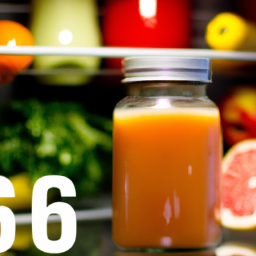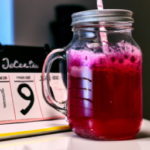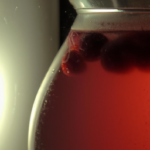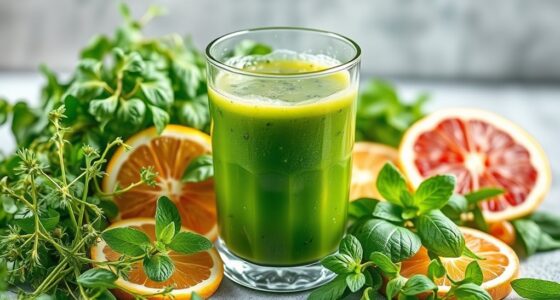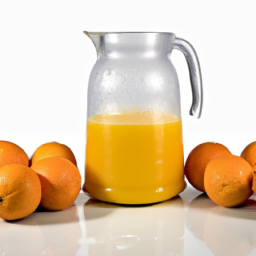Have you ever bought a new juice from a store or made it yourself, only to forget about it and find it weeks later? I have experienced this, and the disappointment of having to throw away what was once a nutritious drink is very real.
But how long can you store fresh juice before it goes bad, and what factors affect its shelf life? In this article, I’ll explore these questions and more, so you can make the most of your fresh juice and avoid wasting money and nutrients.
Fresh juice is a popular beverage choice for its health benefits and refreshing taste. Whether you’re juicing fruits and vegetables at home or buying them pre-made, it’s important to know how long you can keep them before they spoil.
The answer depends on several factors, such as the type of juice, storage conditions, and processing methods. By understanding these factors and implementing best practices for storing fresh juice, you can enjoy its nutritional benefits for as long as possible.
So, let’s dive in and explore the world of fresh juice storage!
Key Takeaways
- Fresh juice has a shorter shelf life depending on the type, storage, and processing, with citrus juice lasting up to 3 days in the fridge and leafy greens within 24 hours.
- Proper storage in an airtight container in the fridge, at 32-40°F, is crucial to prevent bacterial growth and health hazards, with citric acid and antioxidants helping to extend shelf life.
- Cold-pressed juicing preserves nutrients and maximizing shelf life and nutrient content requires proper storage and consumption, with appearance, smell, and taste indicating spoilage.
- Consuming too much fresh juice can lead to gastrointestinal issues, and proper precautions when handling and storing are necessary to avoid unpleasant consequences, including the risk of food poisoning. Proper disposal of spoiled juice is also important for hygiene and environmental reasons, with ways to dispose including compost bin, drain (with caution), and plastic bag in trash.
Types of Fresh Juice
Juice made from citrus fruits like oranges and lemons can be stored for up to three days in the refrigerator. However, it’s important to note that this time frame may vary depending on the type of juice and how it was made.
For example, juice made from leafy greens like kale or spinach should be consumed within 24 hours to ensure maximum nutrient retention.
When it comes to juicing, there are countless juice recipes to choose from, each with their own unique set of benefits. Whether you’re looking to boost your immune system, improve digestion, or simply enjoy a refreshing beverage, there’s a juice recipe for every occasion.
However, it’s important to keep in mind the shelf life of fresh juice and how it can be affected by various factors.
Factors Affecting Fresh Juice Shelf Life
When properly refrigerated, the delicious flavor and vibrant color of your homemade juice will remain intact thanks to factors such as acidity and temperature. However, there are several other factors that can affect the nutrient content and shelf life of fresh juice. One of the most important factors is the type of fruit or vegetable used. Some fruits and vegetables have a shorter shelf life than others, which means that the juice made from these ingredients will also have a shorter shelf life. For example, citrus fruits like oranges and grapefruits have a shorter shelf life than root vegetables like carrots and beets.
Another factor that affects the nutrient content of fresh juice is the impact of processing on juice shelf life. Juicing involves exposing fruits and vegetables to air, light, and heat, which can cause oxidation and the loss of nutrients. The longer the juice is exposed to these factors, the greater the loss of nutrients. Additionally, the method of juicing can also affect the shelf life of the juice. Cold-pressed juicing, for example, can help to preserve the nutrient content of the juice by minimizing heat and oxidation. Ultimately, the key to maximizing the shelf life and nutrient content of fresh juice is to store it properly and consume it as soon as possible after juicing.
Moving on to the next section, let’s explore the question of how long fresh juice can be stored.
How Long Can You Store Fresh Juice
Discover the optimal time frame for savoring your homemade juice by learning how to properly refrigerate and enjoy it. Juice storage methods play a crucial role in determining how long you can store fresh juice.
Ideally, you should consume your juice immediately after making it to enjoy maximum nutritional benefits. However, if you’re looking to store it, there are a few things you need to keep in mind.
First, it’s essential to refrigerate your juice immediately after making it. This will help preserve the nutrients in the juice and keep it fresh for longer. You can also store your juice in an airtight container to prevent oxidation and maintain its freshness.
Generally, fresh juice can last for up to 72 hours in the refrigerator, but the exact time frame may vary depending on the type of juice and storage conditions.
In the next section, we’ll look at the signs of spoiled fresh juice and how to tell if your juice has gone bad.
Signs of Spoiled Fresh Juice
As someone who frequently makes fresh juice, it’s important to be aware of the signs of spoiled juice.
The appearance of the juice can be a telltale sign, as it may start to separate or become discolored.
Additionally, the smell of the juice may become sour or off-putting, indicating that it’s gone bad.
Finally, the taste of the juice may be bitter or unpleasant, which is a clear indication that it’s time to throw it out.
By paying attention to these key indicators, you can ensure that you’re consuming fresh, healthy juice and avoid any potential foodborne illness.
Appearance
You’ll notice that fresh juice may start to lose its vibrant color and clarity over time, but don’t worry, this is normal and doesn’t necessarily mean it’s gone bad.
Juice clarity can be affected by the amount of pulp or sediment in the juice, which can settle at the bottom of the container over time. Color changes can also occur due to exposure to light, air, or heat, but these changes won’t necessarily affect the taste or safety of the juice.
However, if the juice starts to develop an off-putting odor or taste, it’s a sign that it may have started to spoil. This is where the next step comes in – checking for any unusual smells.
Smell
If your nose picks up any funky odors, it’s time to toss that juice! The smell of fresh juice is a good indicator of its freshness. As soon as you detect a sour, musty, or off-putting odor, it’s best to get rid of it. This is because the smell is a sign that the juice is spoiling and no longer fit for consumption.
However, there are ways to preserve the freshness of your juice. One way is to store it in an airtight container to prevent oxidation. This process occurs when the juice comes into contact with air, causing it to lose its flavor and nutritional value. Another way is to keep the juice refrigerated as soon as possible after juicing. This slows down the growth of bacteria and extends the life of the juice. By taking these steps, you can ensure that your fresh juice stays fresh for as long as possible.
Moving on to the next topic, the taste of fresh juice is just as important as its smell and appearance.
Taste
Just like biting into a ripe, juicy fruit, the taste of fresh juice is a burst of flavor that invigorates the senses. The flavor preferences of individuals can vary greatly when it comes to fresh juice, as everyone has their own unique taste buds.
Some may prefer sweeter combinations like apple and carrot, while others may opt for a more savory blend like cucumber and ginger. When it comes to taste, it’s important to experiment with different juice combinations to find what works best for you.
Here are three things to keep in mind when it comes to taste:
- Balance is key – try to incorporate a mix of sweet and savory flavors to create a well-rounded taste.
- Fresh is best – using fresh, high-quality produce will enhance the taste of your juice.
- Be open to new flavors – trying new combinations can lead to discovering new favorite flavors.
Now that we’ve explored the taste of fresh juice, let’s move on to the best practices for storing it.
Best Practices for Storing Fresh Juice
To keep your fresh juice at its best, it’s important to follow these tips for storage. First and foremost, choose the right juice storage containers. Glass bottles with a tight-fitting lid are the best option as they prevent air and light from degrading the juice. Avoid plastic containers as they can release harmful chemicals into the juice over time.
Next, consider the ideal storage temperature. Fresh juice should be stored in the refrigerator at a temperature between 32°F to 40°F (0°C to 4°C) to slow down the growth of bacteria. This will help preserve the quality and nutritional value of the juice for a longer period of time. To emphasize the importance of storage temperature, see the table below:
| Storage Temperature | Shelf Life |
|---|---|
| 32°F to 35°F (0°C to 2°C) | 72 hours |
| 36°F to 38°F (2°C to 3°C) | 48 hours |
| 39°F to 40°F (3°C to 4°C) | 24 hours |
By following these best practices for storing fresh juice, you can enjoy your juice for longer and get the most out of its nutritional benefits. In the next section, I will share some tips for extending the shelf life of fresh juice even further.
Tips for Extending Fresh Juice Shelf Life
As someone who loves to drink fresh juice, I’m always looking for ways to extend its shelf life.
One way to do this is by adding citric acid, which can help prevent the growth of bacteria and mold.
Another method is to use antioxidants, such as vitamin C or E, which can help slow down the oxidation process.
Lastly, vacuum sealing is a great way to keep your juice fresh for longer periods of time by removing any air that could cause spoilage.
Try these tips to make the most out of your fresh juice and enjoy it for longer!
Adding Citric Acid
Citric acid can give your fresh juice an extra zing that will make it last longer. It’s a natural preservative that can help inhibit the growth of bacteria and fungi, which can cause spoilage. Additionally, citric acid can enhance the flavor of your juice, making it taste more refreshing and appealing.
One of the benefits of citric acid is that it’s readily available and inexpensive. You can buy it in powder or crystal form at most grocery stores. However, if you prefer not to use citric acid, there are alternatives for preserving fresh juice. For example, you can use honey or sugar, which are natural sweeteners that can help prolong the shelf life of fresh juice by creating an acidic environment that inhibits bacterial growth.
Another option is to add vitamin C to your juice. Vitamin C is known for its antioxidant properties and can help prevent spoilage and oxidation, which can cause the juice to lose its nutrients and freshness over time. In the next section, I’ll discuss how to use antioxidants to extend the shelf life of your fresh juice.
Using Antioxidants
By adding antioxidants to your juice, you can reap a multitude of benefits. Antioxidants help to neutralize free radicals in your body, which are unstable molecules that can damage your cells and contribute to chronic diseases.
When you incorporate antioxidants into your daily routine, whether through food or supplements, you can help protect your body from these harmful compounds. In addition to their health benefits, antioxidants can also help to extend the shelf life of your fresh juice.
By adding ingredients such as vitamin C-rich fruits or vegetables, like lemon or kale, you can help to prevent oxidation and maintain the nutritional value of your juice. Making small changes like this can make a big difference in the longevity and quality of your homemade juice.
Now, let’s move on to the next topic: vacuum sealing.
Vacuum Sealing
Vacuum sealing is like giving your juice a big, protective hug, keeping it safe from harmful air and extending its freshness. This method of storing juice can be incredibly beneficial, particularly for those who want to keep their juice fresh for as long as possible. One of the biggest benefits of vacuum sealing is that it removes the oxygen from the container, preventing oxidation and slowing the growth of bacteria and other microorganisms that can spoil the juice. Additionally, vacuum sealing helps to preserve the color, flavor, and nutritional value of the juice, ensuring that it tastes just as fresh and vibrant as the day it was made.
To vacuum seal your juice, you will need a vacuum sealing machine and special bags or containers designed for this purpose. These machines work by removing the air from the container and then sealing it shut, creating an airtight environment that will keep your juice fresh for longer. While there are many different types of vacuum sealing machines on the market, it’s important to choose a high-quality model that will be able to effectively remove the air from your juice and create a strong seal. With the right equipment and a little bit of effort, you can enjoy the benefits of vacuum sealing and keep your fresh juice tasting great for days or even weeks to come.
And speaking of nutritional benefits, let’s dive into the next section and explore the many reasons why fresh juice is so good for you.
Nutritional Benefits of Fresh Juice
You’ll feel fantastic when you sip on the succulent and sensational nutritional benefits of fresh juice. Not only does it taste amazing, but it’s also packed with nutrients that can help boost your overall health.
Here are three reasons why fresh juice is a must-try:
-
Fresh juice is rich in vitamins and minerals that are essential for optimal health. When you juice fruits and vegetables, you’re able to extract all the nutrients in a concentrated form, making it easier for your body to absorb. This means that you’ll be getting a higher dose of vitamins and minerals than you would if you were to eat the same amount of produce in its whole form.
-
Drinking fresh juice is an easy way to increase your daily intake of fruits and vegetables. It can be challenging to eat the recommended 5-9 servings of fruits and vegetables every day, but drinking fresh juice is a convenient and delicious way to get closer to that goal.
-
Fresh juice can help improve digestion and boost energy levels. Juicing techniques can help break down the fiber in fruits and vegetables, making it easier for your body to digest and absorb the nutrients. This can lead to improved digestion and increased energy levels throughout the day.
Now that you know the amazing benefits of fresh juice, it’s important to understand the potential health risks of drinking spoiled juice. Drinking spoiled juice can lead to food poisoning and other health issues, so it’s crucial to ensure that you’re storing your fresh juice properly.
Health Risks of Drinking Spoiled Juice
As someone who values the nutritional benefits of fresh juice, it’s important to be aware of the potential health risks of drinking spoiled juice.
Bacterial growth is a major concern when it comes to juice that’s been stored for too long. This can lead to food poisoning and gastrointestinal issues.
It’s crucial to properly store and consume fresh juice to avoid these potential dangers.
Bacterial Growth
Proper storage of fresh juice is crucial to prevent bacterial growth, which can lead to spoilage and potential health hazards. One of the most effective ways to prevent contamination is to use clean equipment and wash all fruits and vegetables thoroughly before juicing.
Once the juice is prepared, it should be stored in an airtight container and refrigerated immediately. The importance of proper refrigeration cannot be overstated. Juices that are left out at room temperature for too long are at risk of bacterial growth, which can lead to food poisoning.
It’s also important to note that different types of bacteria thrive in different conditions. For example, some bacteria prefer warm temperatures while others can grow in cold environments. This means that even if you refrigerate your juice, it’s still possible for bacteria to grow if the temperature is not optimal.
To ensure maximum safety, it’s recommended that you consume fresh juice within 24 hours of preparation. In the next section, we will discuss the potential dangers of consuming spoiled juice and the symptoms of food poisoning.
Food Poisoning
If you don’t handle your juice properly, there’s a risk of getting sick from food poisoning caused by harmful bacteria. Prevention measures are crucial to avoid this problem. Here are 5 important things to keep in mind:
- Always wash your hands thoroughly before handling any food products.
- Use clean and sanitized equipment when preparing your juice.
- Keep your juice refrigerated at all times, and make sure it’s not left at room temperature for more than 2 hours.
- Avoid using fruits or vegetables that are past their prime or show any signs of spoilage.
- If you’re not sure about the safety of your juice, it’s best to throw it away.
If you do experience symptoms of food poisoning, such as nausea, vomiting, diarrhea, fever, and stomach cramps, it’s important to seek medical attention right away. Treatment options may include antibiotics, rehydration therapy, and rest. Don’t ignore these symptoms, as they can lead to serious health complications.
As we move into the next section about gastrointestinal issues, it’s important to note that food poisoning can be a major cause of these types of problems. Taking proper precautions when handling and storing your juice can help you avoid any unpleasant consequences.
Gastrointestinal Issues
Now let’s talk about how your tummy might feel after drinking a lot of juice. While fresh juice can be a healthy addition to your diet, consuming too much of it can lead to gastrointestinal issues. This is because fresh juice is high in fructose, which can cause bloating, gas, and diarrhea in some people. Additionally, consuming large amounts of juice can cause a rapid increase in blood sugar levels, which can further aggravate gastrointestinal issues.
To prevent gastrointestinal issues from drinking too much juice, it is important to consume it in moderation. Limit your intake to no more than 8 ounces per day, and try diluting it with water to reduce the sugar content. If you do experience symptoms such as bloating or diarrhea, there are some medical treatments that can help alleviate them. Over-the-counter medications such as Imodium or Pepto-Bismol can provide relief, but it is important to consult with a healthcare professional if symptoms persist or worsen.
Proper disposal of spoiled juice is essential to prevent food poisoning.
Proper Disposal of Spoiled Juice
When your fresh juice has spoiled, what steps do you take to dispose of it? Proper disposal of spoiled juice is important not just for hygiene reasons, but for its environmental impact as well. Here are some ways on how I dispose of my spoiled juice:
-
I pour the spoiled juice into a compost bin. This way, the nutrients from the juice can still be used to nourish the soil and plants.
-
If I don’t have a compost bin, I pour the juice down the drain and flush it with plenty of water. However, this shouldn’t be done regularly as it may cause clogs in the drain.
-
As a last resort, I pour the spoiled juice in a plastic bag and tie it tightly before throwing it in the trash bin. This ensures that the liquid doesn’t leak and cause a mess.
Proper disposal of spoiled juice not only helps in keeping the environment clean and healthy, but also prevents the spread of harmful bacteria and disease. It’s important to be mindful of our actions and their impact on the environment, even in small ways such as disposing of spoiled juice.
Frequently Asked Questions
Can you freeze fresh juice to extend its shelf life?
Yes, you can freeze fresh juice to extend its shelf life. However, freezing can lead to nutrient loss in the juice. To minimize this, freeze the juice in airtight containers and consume within 2-3 months.
Does the type of juicer used affect the shelf life of fresh juice?
I investigated if juicer type affects nutrient retention in fresh juice. Results show that centrifugal juicers have lower nutrient retention compared to masticating juicers. It’s important to choose the right juicer for maximum nutrient benefits.
Is it safe to consume fresh juice past its expiration date?
Consuming fresh juice past its expiration date may be unsafe as it can lead to bacterial growth. Shelf stability is affected by factors such as temperature and exposure to light. Nutritional value can also be impacted over time.
Are there any additives or preservatives that can be added to fresh juice to prolong its shelf life?
I’ve found that juice preservation methods can involve adding natural preservatives like citric acid or ascorbic acid. These can extend the shelf life of fresh juice, but it’s still best to consume it within a few days for optimal freshness.
How often should you clean your juicer to prevent spoilage of fresh juice?
Regular cleaning of your juicer is essential to prevent spoilage of fresh juice. Best cleaning practices include disassembling and washing all parts immediately after use, using a brush to remove pulp, and sanitizing with hot water and vinegar.
Conclusion
In conclusion, as someone who loves to drink fresh juice, I’ve learned that the shelf life of each type of juice varies depending on several factors. It’s important to know how long you can store fresh juice to avoid drinking spoiled juice, which can pose significant health risks.
To ensure the quality and safety of your fresh juice, always follow best practices for storing and extending its shelf life. Remember, fresh juice is not only delicious but also packed with essential nutrients that offer numerous health benefits. By consuming fresh juice regularly, you can enjoy a boost in your immune system, digestion, and overall health.
However, always keep in mind the proper disposal of spoiled juice to avoid any contamination and risk to you and others. As the saying goes, "an ounce of prevention is worth a pound of cure."So, take care of your fresh juice, and it’ll take care of you.
Ilana has been a vegan for over 10 years. She originally made the switch for health reasons, but soon found herself becoming more and more passionate about the ethical and environmental implications of a vegan lifestyle. Ilana is the author of The Graceful Kitchen, a blog all about veganism. She loves to cook up delicious and nutritious vegan meals, and share her recipes with others who are interested in leading a cruelty-free life. Ilana is also a strong advocate for using whole foods as the foundation of a healthy diet, and believes that going vegan is one of the best ways to achieve this.
